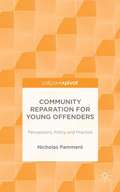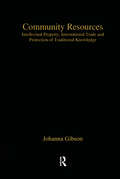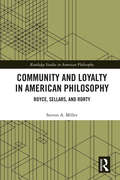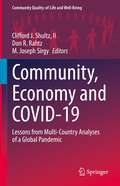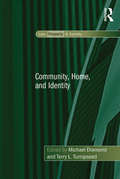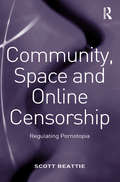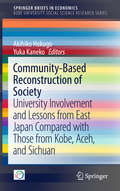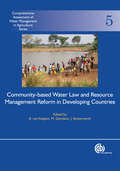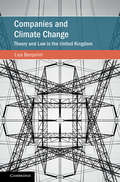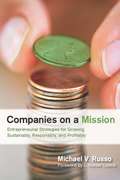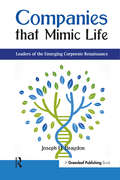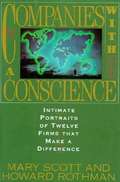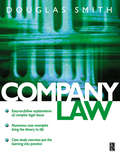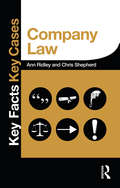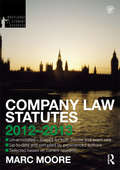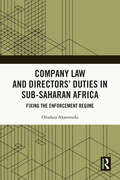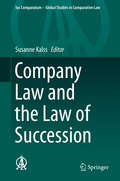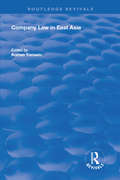- Table View
- List View
Community Reparation for Young Offenders: Perceptions, Policy and Practice
by Nicholas PammentCommunity reparation for young offenders involves unpaid work such as painting and decorating, litter picking and graffiti removal. Whilst remaining a major part of the youth justice landscape, concern has been raised about the poor quality of workplace provision. In this book, Nicholas Pamment provides the first fully researched examination of community reparation. He establishes the most comprehensive model for the effective delivery of unpaid work, demonstrating the importance of 'meaningful' work placements which facilitate key employability skills, associated with reductions in re-offending. Drawing upon empirical evidence and the experience of offenders, he warns against a formulaic approach to workplace allocation, where there is an over-reliance on low cost menial tasks. His timely study concludes that more attention needs to be paid to the rehabilitative potential of community reparation, requiring the commitment and dedication of service providers.
Community Resources: Intellectual Property, International Trade and Protection of Traditional Knowledge (Globalization and Law)
by Johanna GibsonProtection of traditional knowledge and resources is of critical concern not only to the groups involved but also to the international trading community for which these resources are of increasing economic importance. This work examines the concept of 'community', intellectual property models and additional sources for protection at international law (including environmental and human rights frameworks). Intellectual property law is critiqued as an inadequate framework to address the fundamental object of protection for the communities themselves - the management of traditional use, as well as the biological and cultural sustainability of this use. The work sets out an international framework based on the concept of 'community resources', recognizing the unique claims embodied in traditional knowledge, incorporating customary law, and facilitating community management of resources. International in perspective and scope, the book will be a valuable resource for academics and researchers in law, international relations and cultural studies.
Community and Loyalty in American Philosophy: Royce, Sellars, and Rorty (Routledge Studies in American Philosophy)
by Steven A. MillerAmerican pragmatism has always had at its heart a focus on questions of communities and ethics. This book explores the interrelated work of three thinkers influenced by the pragmatist tradition: Josiah Royce, Wilfrid Sellars, and Richard Rorty. These thinkers’ work spanned the range of twentieth-century philosophy, both historically and conceptually, but all had common concerns about how morality functions and what we can hope for in our interactions with others. Steven Miller argues that Royce, Sellars, and Rorty form a traditional line of inheritance, with the thought of each developing upon the best insights of the ones prior. Furthermore, he shows how three divergent views about the function, possibilities, and limits of moral community coalesce into a key narrative about how best we can work with and for other people, as we strive to come to think of widely different others as somehow being morally considerable as "one of us."
Community, Economy and COVID-19: Lessons from Multi-Country Analyses of a Global Pandemic (Community Quality-of-Life and Well-Being)
by M. Joseph Sirgy Don R. Rahtz Clifford J. Shultz IIThis volume explores the impact of the COVID-19 pandemic on the health, safety, and socioeconomic well-being of community residents of selected countries around the world. It is built on an overarching framework of studying community well-being, applied here to the analyses of one of the most significant crises of our time. Most important are the lessons learned from the experiences in these countries – including insights and recommendations on how to mitigate future pandemics. Building on years of research, each chapter is written by an accomplished scholar with interests and expertise on various assessments of community well-being development in the country of study. The authors share cases and analyses, and highlight failures and successes; they offer sound policy recommendations on how to restore the health, safety, and multidimensional wellness of community residents, and how to decrease the likelihood and impact of future crises. Some of the policy recommendations in this multi-country compendium can be used to assist crisis prevention and recovery, beyond pandemics. The volume shows how the lessons learned and shared from community responses to the pandemic can provide critical and useful policy insights to shape best practices in mitigating other disasters like hurricanes, floods, earthquakes, tornadoes, wars, riots, acts of domestic and international terrorism, weapons of mass destruction and industrial accidents. This is a must-read for researchers across the social sciences, health sciences, and management studies, and for government and non-government professionals involved in community health and well-being.
Community, Home, and Identity (Law, Property and Society)
by Terry L. TurnipseedCommunity, home, and identity are concepts that have concerned scholars in a variety of fields for some time. Legal scholars, sociologists, anthropologists, psychologists, and economists, among others, have studied the impacts of home and community on one's identity and how one's identity is manifested in one's home and in one's community. This volume brings together some of the leading thinkers about the connections between community, home and identity. Several chapters address how the law and lawyers contribute (or detract) from the creation and maintenance of community and, in some cases, the conscious destruction of communities. Others examine the protection of individual and group identities through rules related to property title and use of such things as Home and 'identity property'.
Community, Space and Online Censorship: Regulating Pornotopia
by Scott BeattieInternet censorship is a controversial topic - while the media periodically sounds alarms at the dangers of online life, the uncontrollable nature of the internet makes any kind of pervasive regulatory control impossible. This book compares the Australian solution, a set of laws which have been criticized as being both draconian and ineffectual, to major regulatory systems in the UK and US and understanding what drives them. The 'impossibility' of internet regulation opens deeper issues - what do we mean by regulation and how do we judge the certainty and effectiveness of law? These questions lead to an exploration of the theories of legal geography which provide tools to understand and evaluate regulatory practices. The book will be a valuable guide for academics, students and policy makers working in media and censorship law, those from a civil liberties interest and people interested in internet theory generally.
Community-Based Reconstruction of Society: University Involvement and Lessons from East Japan Compared with Those from Kobe, Aceh, and Sichuan (SpringerBriefs in Economics)
by Akihiko Hokugo Yuka KanekoThis volume presents an academic proposal, developed by a joint research group of leading scholars in the social and natural sciences from universities affected by global-scale mega disasters occurring in Asia in recent decades. These include Kobe University, which experienced the 1995 Hanshin-Awaji Earthquake; Tohoku University and Iwate University, both at the center of post-disaster reconstruction following the 2011 East Japan Earthquake and Tsunami; Syiah Kuala University in Aceh, Indonesia, which was hard-hit by the 2004 Indian Ocean Tsunami; and Sichuan University, which took a leading role in post-disaster recovery following the 2004 Sichuan Earthquake. Presenting a comparative analysis focused on lessons learned from the recovery phase following the East Japan Earthquake and Tsunami, the book addresses in detail the questions of what should be done to enable truly community-based town planning, and what roles should be played by universities in order to achieve those goals.
Community-based Water Law and Water Resource Management Reform in Developing Countries
by B. C. P. van Koppen Mark Giordano John ButterworthContributors from various specialties of engineering and of social science analyze operating community-based water laws in Africa, Latin America, and Asia; and critically examine the interface between community-based water laws, formal water laws, and a variety of other institutional dimensions in ongoing water resource management reform. Most of the 15 studies were selected from presentations to a January 2005 international conference in Johannesburg, which focused on rural Africa. Annotation ©2008 Book News, Inc. , Portland, OR (booknews.com)
Como Salvar o Seu Casamento: Impeça o Divórcio e Fortaleça o Seu Relacionamento Com o Seu Cônjuge
by Kathleen WatersUm livro entusiasmante sobre como salvar um casamento que se encontra à beira de um divórcio eminente. A autora tem um olho clininco para as questões que fundamentalmente deve ser resolvidas num casamento, como as formas de comunicação e o perdão. Um guia prático que pode ser utilizado por qualquer um de nós, basta mantermos a mente aberta a novas perspetivas e vontade de pôr as mãos ao trabalho para salvar um dos nossos bens mais preciosos: A nossa familia.
Como Se Recuperar do Divórcio: O Guia Para Superar Seu Ex-Cônjuge e Começar Novos Relacionamentos
by Steve SimonUm divórcio pode ser uma das coisas mais difíceis que você terá que lidar. Pode deixar indivíduos arruinados emocionalmente e financeiramente. Este guia o(a) ajudará a se recuperar de um divórcio e ser mais feliz do que nunca. Passo a passo, nós o(a) mostraremos como se recompor e começar de novo. Se está procurando por uma cura emocional ou seguir em frente com outro relacionamento, este guia é para você! O que está incluído: - Um Programa Eficaz e Rápido. - Aumente Sua Produtividade. - Aumente Sua Felicidade. - Comece Novos Relacionamentos. - Lide Com Traumas Emocionais. E MUITO MAIS!
Companies and Climate Change: Theory and Law in the United Kingdom (Cambridge Studies on Environment, Energy and Natural Resources Governance)
by Lisa BenjaminCompanies lie at the heart of the climate crisis and are both culpable for, and vulnerable to, its impacts. Rising social and investor concern about the escalating risks of climate change are changing public and investor expectations of businesses and, as a result, corporate approaches to climate change. Dominant corporate norms that put shareholders (and their wealth maximization) at the heart of company law are viewed by many as outdated and in need of reform. Companies and Climate Change analyzes these developments by assessing the regulation and pressures that impact energy companies in the UK, with lessons that apply worldwide. In this work, Lisa Benjamin shows how the Paris Agreement, climate and energy law in the EU and the UK, and transnational human rights and climate litigation, are regulatory and normative developments that illustrate how company law can and should act as a bridge to progressive corporate climate action.
Companies on a Mission: Entrepreneurial Strategies for Growing Sustainably, Responsibly, Profitably
by Michael V. Russo<div><p class="description">"Let your social and environmental conscience be your guide" can be a successful and durable strategy for a firm. This is the first book to explain how following a vision for the earth and for society can be a powerful route to profits for small and medium sized companies.</p> <p class="description"><i>Companies on a Mission</i> explains that mission-driven companies appreciate and leverage traditional strategic principles--with a twist--to win in the marketplace. By clearly and pragmatically laying out this argument, author Michael V. Russo crystallizes for enlightened businesses what Michael Porter made clear for mainstream firms years ago. The book shows that a mission-driven approach creates significant barriers to imitation by larger, established rivals. Mission-driven firms build their brands on authenticity. Only you are you. And, authenticity builds customer loyalty. Later in the book, Russo moves beyond the firm level to look at these companies in context. He finds, for instance, that just as specific industries often develop in geographic clusters, mission-driven companies also aggregate. But, they put down roots where other businesses are pursuing complementary goals. Portland and the Bay Area are two such hotbeds. This allows for cooperation, as opposed to breeding stiff competition.</p> <p class="description">The rise to prominence of mission-driven companies like Patagonia, Seventh Generation, Kettle Foods, and Calvert Group is undoubtedly the result of powerful trends in consumer markets, including the rise of conscious consumerism, the transparency movement, and fallout from global competition. Most books that address social and environmental issues are focused on large corporations, crafted as autobiographies by CEOs, or written as moral calls to action without regard for the bottom line. <i>Companies on a Mission</i> both chronicles a movement and provides grounded guidance to entrepreneurs and managers who wish to join the wave. For these readers, this book is a one-of-a-kind bible.</p></div>
Companies that Mimic Life: Leaders of the Emerging Corporate Renaissance
by Joseph H. BragdonIndustrial capitalism is broken. The signs, which transcend national ideologies, are everywhere: climate change; ecological overshoot; financial exhaustion; fraying social safety nets; corporate fraud; government deceit; civic unrest; terrorism; and war. But there is hope. This book tells how transformation is taking root in the corporate world – the last place many of us would look for solutions. The book tells the stories of seven exceptional companies. Their shared secret is a new mental model of the firm that is the virtual opposite of industrial capitalism. Each company, if not already a household name, is a significant player within their industry and, crucially, has outperformed their competitors. Lessons can be learned. It works like this. Instead of modeling themselves on the assumed efficiency of machines – a thought process that emerged during the industrial age – these firms model themselves on living systems. Firms with open, ethical, inclusive traditions – where employees have a voice and a stake in what happens – have a distinct advantage over traditionally managed companies where most decisions are made at the top. Understanding that everything of value ultimately arises from life, they place a higher value on living assets (people and Nature) than they do on non-living capital assets. The energy they invest in stewarding those assets – a practice described in the book as living asset stewardship (LAS) – is transformative.
Companies with a Conscience: Intimate Portraits of Twelve Firms That Make a Difference
by Mary Scott Howard RothmanThe vision, mission, principles, and compassion that govern twelve successful companies
Companies, International Trade and Human Rights
by Janet DineOriginally published in 2005, this book focuses on the role of corporations within the trading system, and the complex relationships between corporations, nation states and international organisations. The actions and motives that drive corporations are considered as well as the structure of the international trading system. Remedial devices such as Codes of Conduct and Human Rights instruments are assessed for effectiveness. The book seeks reasons for what is a growing understanding that international trading regimes are not meeting objectives found in many international agreements, including both the international trade agreements themselves (WTO, GATT, TRIPS etc. ) and human rights instruments. In particular, it is clear that the prevalence and severity of poverty is not being adequately addressed. This work sets out to investigate the role played by companies in this failure in the globalisation of trade to realise its aims, in particular the failure to achieve the minimum of basic rights, the right to food.
Company Directors' Liability and Creditor Protection (Contemporary Commercial Law)
by Andrew KeayThe book provides an analytical exposition of the law concerning directors’ liability for the losses sustained by their companies’ creditors, when the directors’ companies are in financial distress or become insolvent. It is a detailed one-stop resource for obtaining a good understanding of the law which has developed from legislation and case law. In particular, there is a detailed consideration of what needs to be proved, what defences there are, and what might be the issues of concern for all parties. A doctrinal method is adopted and there is extensive analysis of the relevant legislation and case law. Rather than merely referring to cases to support propositions, the discussion considers many of the cases in context and in depth and their relevance to the aim of the book. The book also endeavours to provide views, in a practical way, on aspects of the law and it identifies problems and how they may be addressed. Of interest to legal practitioners and insolvency practitioners alike, in addition the book will be useful to directors, government officials and academics.
Company Directors' Responsibilities to Creditors
by Andrew KeayThis timely work is the first to comprehensively examine directors' responsibilities to creditors in times of financial strife, as well as addressing when these responsibilities arise, and what directors should have to do to ensure that they comply with their obligations. Keay explores the relevant issues from doctrinal, normative and comparative perspectives and addresses the question as to when directors are liable for wrongful trading, fraudulent trading or breach of their duties to creditors and whether directors should be held responsible for the before mentioned. Besides the relevant UK legislation and case law, legislation and case law from Australia, Canada, Ireland and the United States are examined and compared and reforms which take into account the aims and rationale of the relevant legislation as well as creditors' interests are proposed and assessed. Importantly, new approaches for courts which would make the nature of the responsibility and its timing more precise are suggested. Company directors have certain responsibilities to creditors of their companies. In particular, they should avoid fraudulent and wrongful trading and consider, as part of their duties, the interests of creditors when their companies might be, or are, in financial difficulty. The work is precipitated by the lack of coherence in the consideration of wrongful trading and the recent delivery of important cases on fraudulent trading. Also, this timely work is the first to comprehensively examine directors' responsibilities to creditors in times of financial strife, as well as addressing when these responsibilities arise, and what directors should have to do to ensure that they comply with their obligations. Keay explores the relevant issues from doctrinal, normative and comparative perspectives and seeks to address the question as to when directors are liable for wrongful trading, fraudulent trading or breach of their duties to creditors and whether directors should be held responsible for wrongful trading and failing to consider the interests of creditors. Besides the relevant UK legislation and case law, legislation and case law from Australia, Canada, Ireland and the United States are examined and compared, and reforms which take into account the aims and rationale of the relevant legislation as well as creditors' interests are proposed and assessed. Importantly, new approaches for courts which would make the nature of the responsibility and its timing more precise are suggested.
Company Law
by Douglas SmithCompany Law is essential reading for business and law students, and for those studying for professional exams. The theoretical concepts are explored and developed with the use of a variety of case examples to place the learning in context. Comprehensive pedagogy with objectives, review questions, summaries, discussion questions and a case study exercise to consolidate the learning in each chapter. The accessible and concise treatment of the issues explored makes the learning easy to follow and more pertinent to the student needs, particularly for those who are studying a one-semester course. Easy to read,with a user friendly layout, Company Law, with the use of case studies and review questions leads the reader through the various stages involved with creating and managing a private company through to dissolution.Building on the learning covered in the companion textbook Business Law, this text is a user friendly and comprehensive introduction to all aspects of company law.
Company Law (Key Facts Key Cases)
by Chris Shepherd Ann RidleyKey Facts Key Cases Company Law will ensure you grasp the main concepts of your Company Law module with ease. This book explains the facts and associated case law for: - Shares - Capital Maintenance - Failure and Liquidation - Directors - Borrowing Ann Ridley is Interim Dean, Business and Management, Accounting and Law at The University of Gloucestershire. Chris Shepherd is Lecturer in Law at London South Bank University. Key Facts Key Cases is the essential series for anyone studying law at LLB, postgraduate and conversion courses. The series provides the simplest and most effective way to absorb and retain all of the material essential for passing your exams. Each chapter includes: diagrams at the start of chapters to summarise key points structured headings and numbered points to allow for clear recall of the essential points charts and tables to break down more complex information Chapters are also supported by a Key Cases section which provides the simplest and most effective way to absorb and memorise essential cases needed for exam success. Essential and leading cases are explained The style, layout and explanations are user friendly Cases are broken down into key components by use of a clear system of symbols for quick and easy visual recognition Series editors: Jacqueline Martin and Chris Turner LLM, who is Senior Lecturer in law at Wolverhampton University.
Company Law Statutes 2012-2013 (Routledge Student Statutes)
by Marc Moore‘Focused content, layout and price - Routledge competes and wins in relation to all of these factors’ - Craig Lind, University of Sussex, UK ‘The best value and best format books on the market.’ - Ed Bates, Southampton University, UK Routledge Student Statutes present all the legislation students need in one easy-to-use volume. Developed in response to feedback from lecturers and students, this book offers a fully up-to-date, comprehensive, and clearly presented collection of legislation - ideal for LLB and GDL course and exam use. Routledge Student Statutes are: • Exam Friendly: un-annotated and conforming to exam regulations • Tailored to fit your course: 80% of lecturers we surveyed agree that Routledge Student Statutes match their course and cover the relevant legislation • Trustworthy: Routledge Student Statutes are compiled by subject experts, updated annually and have been developed to meet student needs through extensive market research • Easy to use: a clear text design, comprehensive table of contents, multiple indexes and highlighted amendments to the law make these books the most student-friendly Statutes on the market Competitively Priced: Routledge Student Statutes offer content and usability rated as good or better than our major competitor, but at a more competitive price • Supported by a Companion Website: presenting scenario questions for interpreting Statutes, annotated web links, and multiple-choice questions, these resources are designed to help students to be confident and prepared.
Company Law and Directors’ Duties in Sub-Saharan Africa: Fixing the Enforcement Regime (Routledge Studies on Law in Africa)
by Oludara AkanmiduThis book provides a critical analysis of the enforcement regime for breach of directors’ duties in sub-Saharan Africa. Focusing on Nigeria, Kenya, Ghana, and Tanzania, it interrogates the current ‘state of play’ regarding the enforcement of directors’ duties in sub-Saharan African countries.The book examines the effectiveness of enforcement, the reasons for its successes or failures and how it might be improved in these countries. Finally, taking into consideration the specific socio-cultural context of the countries in question, it offers persuasive and practical avenues for reform.This book will be of interest to scholars and practitioners of comparative corporate law and corporate governance in Africa.
Company Law and Sustainability
by Sjåfjell, Beate and Richardson, Benjamin J. Beate Sjåfjell Benjamin J. RichardsonThis investigation of the barriers to and opportunities for promoting environmental sustainability in company law provides an in-depth comparative analysis of company law regimes across the world. The social norm of shareholder primacy is the greatest barrier preventing progress, and it also helps explain why voluntary action by companies and investors is insufficient. By deconstructing the myth that shareholder primacy has a legal basis and challenging the economic postulates on which mainstream corporate governance debate is based, Company Law and Sustainability reveals a surprisingly large unexplored potential within current company law regimes for companies to reorient themselves towards sustainability. It also suggests possible methods of reforming the existing legal infrastructure for companies and provides an important contribution to the broader debate on how to achieve sustainability.
Company Law and the Law of Succession (Ius Comparatum - Global Studies in Comparative Law #5)
by Susanne KalssThis book is one of the first to link company law to the law of succession by concentrating on family businesses. It shows that, to understand the legal framework underlying the daily operations of family businesses, one needs legal analysis, empirical data, psychological and sociological knowledge. The book works on the premise that, since many businesses have been founded by families, practitioners need to develop an understanding of the legal background of such businesses and build up experience to be able to create contracts, trusts, foundations and other legal mechanisms to give shape to systems and procedures for the transfer of shares and control within the family. Comparing the national legal order, techniques, and mechanisms in a range of countries, the book examines parallel developments in these fields of law across the world. Finally, it demonstrates the room for companies, shareholders and the members of a family to develop individual solutions within the legal framework for transferring businesses and shares to the next generation.
Company Law in East Asia (Routledge Revivals)
by Roman TomasicFirst published in 1999, this volume provides an overview of company laws in South East Asia, North East Asia and the Pacific. The chapters adopt a standard format to allow for comparisons to be made as well as highlighting key features of company laws in each jurisdiction. The contributors are experts in their fields and present practical and policy related insights. The book also contains some useful overviews of company law themes in Asia.
Company Lawcards 2012-2013 (Lawcards)
by RoutledgeRoutledge Lawcards are your complete, pocket-sized guides to key examinable areas of the undergraduate law curriculum and the CPE/GDL. Their concise text, user-friendly layout and compact format make them an ideal revision aid. Helping you to identify, understand and commit to memory the salient points of each area of the law, shouldn’t you make Routledge Lawcards your essential revision companions? Fully updated and revised with all the most important recent legal developments, Routledge Lawcards are packed with features: Revision checklists help you to consolidate the key issues within each topic Colour coded highlighting really makes cases and legislation stand out Full tables of cases and legislation make for easy reference Boxed case notes pick out the cases that are most likely to come up in exams Diagrams and flowcharts clarify and condense complex and important topics '...an excellent starting point for any enthusiastic reviser. The books are concise and get right down to the nitty-gritty of each topic.' - Lex Magazine Routledge Lawcards are supported by a Companion Website offering: Flashcard glossaries allowing you to test your understanding of key terms and definitions Multiple Choice Questions to test and consolidate your revision of each chapter Advice and tips to help you better plan your revision and prepare for your exams Titles in the Series: Commercial Law; Company Law; Constitutional Law; Contract Law; Criminal Law; Employment Law; English Legal System; European Union Law; Evidence; Equity and Trusts; Family Law; Human Rights; Intellectual Property Law; Jurisprudence; Land Law; Tort Law
